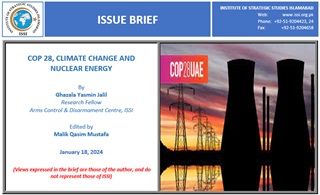Nuclear energy came into focus at the United Nations Climate Change Conference (COP28), held in UAE in December 2023, when 20 countries pledged to triple nuclear power capacity by 2050. The International Atomic Energy Agency (IAEA) in its statement said that “the goal of global net zero carbon emissions can only be reached by 2050 with swift, sustained and significant investment in nuclear energy…. [it is] important part of the solution to climate change and energy insecurity.”[1] Nuclear energy has zero carbon emissions and is seen as part of the solution to transition away from fossil fuels and triple renewable energy capacity. Belgium, France and IAEA also announced that the world’s first Nuclear Energy Summit will be held in Brussels in March 2024 in order to build on the global momentum on nuclear power. The Summit is expected to host representatives and experts from 30 countries. The Summit will showcase the IAEA’s Atom4NetZero initiative, which supports efforts by Member States to harness the power of nuclear energy in the transition to net zero by providing technical expertise and scientific evidence on the potential of nuclear energy to decarbonize electricity production.[2]
According to UN figures, 32 countries worldwide are operating 443 nuclear reactors for electricity generation, while 55 new nuclear plants are under construction.[3] Nuclear energy provides about 10 percent of the world’s electricity and about 26 percent of the world’s low-carbon electricity.[4] The IAEA’s annual nuclear power outlook projection sees installed nuclear capacity of 369 gigawatts today, doubling to 890 gigawatts by 2050.[5]
















